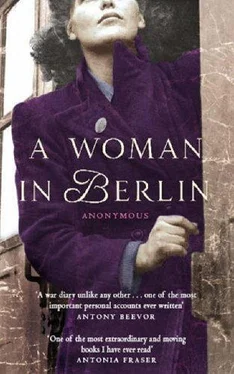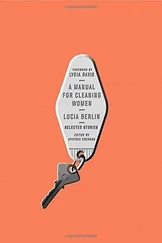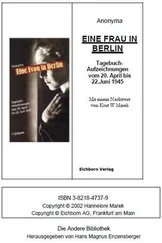Marta Hillers - A Woman in Berlin
Здесь есть возможность читать онлайн «Marta Hillers - A Woman in Berlin» весь текст электронной книги совершенно бесплатно (целиком полную версию без сокращений). В некоторых случаях можно слушать аудио, скачать через торрент в формате fb2 и присутствует краткое содержание. Город: London, Год выпуска: 2006, ISBN: 2006, Издательство: Virago Press, Жанр: dissident, Биографии и Мемуары, prose_military, на английском языке. Описание произведения, (предисловие) а так же отзывы посетителей доступны на портале библиотеки ЛибКат.
- Название:A Woman in Berlin
- Автор:
- Издательство:Virago Press
- Жанр:
- Год:2006
- Город:London
- ISBN:978-1-84408-112-7
- Рейтинг книги:5 / 5. Голосов: 3
-
Избранное:Добавить в избранное
- Отзывы:
-
Ваша оценка:
- 100
- 1
- 2
- 3
- 4
- 5
A Woman in Berlin: краткое содержание, описание и аннотация
Предлагаем к чтению аннотацию, описание, краткое содержание или предисловие (зависит от того, что написал сам автор книги «A Woman in Berlin»). Если вы не нашли необходимую информацию о книге — напишите в комментариях, мы постараемся отыскать её.
, Cleveland), the anonymous author depicts her fellow Berliners in all their humanity as well as their cravenness. And with bald honesty and brutal lyricism (
), she tells of the shameful indignities to which women in a conquered city are always subject.
is, to quote A. S. Byatt, essential, and a classic of war literature.
A Woman in Berlin — читать онлайн бесплатно полную книгу (весь текст) целиком
Ниже представлен текст книги, разбитый по страницам. Система сохранения места последней прочитанной страницы, позволяет с удобством читать онлайн бесплатно книгу «A Woman in Berlin», без необходимости каждый раз заново искать на чём Вы остановились. Поставьте закладку, и сможете в любой момент перейти на страницу, на которой закончили чтение.
Интервал:
Закладка:
Sure enough, we started off with some thick barley soup. Then we crossed over the railway embankment to the work halls, where we saw German prisoners slaving away – old men in shabby clothes, probably Volkssturm. They groaned as they lifted heavy gear wheel flanges onto the trains. They milled about alongside us, eyeing us intently. I didn’t catch on, but some others did, and slipped them bits of bread on the sly. That’s not allowed, but the Russian guard looked steadfastly the other way. The men were unshaven and emaciated, with the gaping eyes of wretched dogs. They didn’t look like Germans at all to me. They resembled the Russian POWs we used to see while the fighting was still on, the ones forced to clear rubble from the ruins. This, too, is a logical reversal.
Back in the hall. Our first task was to haul unwieldy iron bars, in groups of two or three, after that we passed rods and pieces of plate metal down the chain out to the freight wagon. A Russian came in, looked us over, waved two women aside and then a third. The third was me. We trotted after him. Where to? One of us speculated, ‘Maybe to peel potatoes?’ They’d already taken a dozen women to do exactly that out by the railway embankment where the Russian trailers with those fancy curtains are located.
No, he was taking us some place else, over to a dilapidated shack and down a dreary corridor where the faecal stench grew more and more unbearable. One woman decided to take off; she simply bolted back, cutting across the landing. After that the Russian made the two of us who were left march in front of him. He led us into a room with a stone floor. We saw a boiler, tubs, washboards, buckets. He pointed at the equipment and made a gesture of washing laundry.
That was fine with us, but not there in that hovel. The other woman, a pert little person with lively eyes, helped me drag the largest washtub outside the shed, onto a kind of porch. We felt safer there, and it didn’t stink so much. The Russian didn’t object. He brought us two pieces of hard soap and a number of previously white overalls, shirts and handkerchiefs, and signalled to us to wash them. Although his tone was curt, he wasn’t unfriendly, and he didn’t grope us in any way, not even with his eyes.
My fellow washerwoman revealed that she was from Danzig and exchanged a few snippets of Polish with the Russian. So much the better! That way I don’t have to talk, I can keep my Russian hidden. I don’t want to speak with them as a washerwoman.
Other soldiers kept coming over in groups, lounging around the washtubs and gossiping about us. Two of them debated how old we might be. After much back and forth they decided I was twenty-four: Not bad!
The hours crawled by. We soaped and rubbed and fetched warm water from the company kettle, cold water from the hydrant on the street. I rubbed my fingers raw on all the filthy clothing. The towels were rigid with grease. They were all monogrammed hand towels from German families – war booty. I scrubbed away with a hairbrush – quite a struggle. Meanwhile the Russians refused to leave us in peace, pinching us where they could. I batted them away like a horse switching at flies, and sprayed them with water from my hairbrush, but didn’t say a word. Now and then our boss came over and chased off the Romeos. Then he brought us some underwear – fastened with laces instead of buttons.
The whole time the woman from Danzig was telling me in a monotone how several Ivans went at her mother, who already has grandchildren. Using her Danzig Polish, she had asked if the men weren’t ashamed to rape such an old woman. To which they gave the classic answer, in German: ‘You old, means you healthy.’
I was on the verge of keeling over right at the washtub when our boss showed up and announced it was time for lunch. He brought each of us a mess tin full of rich, fatty soup with meat, cucumbers and bay leaves, and a tin plate of pea porridge well laced with bacon. It seems he is a cook, and a good one at that. The food tasted fabulous. I could feel my strength reviving.
We went on washing for an eternity 2 p.m., 3 p.m., 4 p.m., 5 p.m., 6 p.m. We washed without a break, under constant supervision. We soaped the clothes and wrung them out and fetched water. Our feet ached; our knuckles were close to bleeding. The Russians watching us enjoyed the spectacle; they rubbed their hands in gleeful revenge, thinking they’d really got to us with the washing. ‘Ha ha ha, now you have to wash for us, serves you right!’ The woman from Danzig merely grinned. I played deaf and dumb, smiled all around, and washed and washed. The men were amazed. I heard one say to another, ‘They work well. Always cheerfully, too.’
We dragged out the work on the last hand towels until it was 6 p.m., then cleaned the washtubs and wandered over to the canteen, where everyone was given a dollop of mush. After that all the women started to head home, us included, but when we reached the gate the guards chased us back, crying, ‘Rabota!’ The women started screaming all at once and pushed their way to the gate, ready to mutiny. But the eight-hour day doesn’t apply to the vanquished. A soldier pushed at us, brandishing his rifle and calling out threateningly: ‘Woman! Rabota!’ That’s one Russian word everyone’s learned by now
Everyone had to return to the hall and load more iron parts. Silent and worn out, we passed one another the rods and plates. Handling cold iron when your hands have been washing all day hurts something fierce.
Finally, towards 8 p.m., our overseer called out that the freight wagon was full. That was an understatement: it groaned when the locomotive hauled it away. Perhaps the floor will give way before the train reaches Moscow. One old worker, who’d been sitting on top of the car, jumped off as it was moving. He claimed they should have let him stay right where he was so he could go with the rest of the transport; after all, ‘What’s left for us here?’ And he pointed at the hall, deserted and stripped bare. ‘Where are our husbands going to work now?’ the women asked.
An hour later I was home, dead tired this time, with hands so stiff I don’t feel much like writing. At the same time I’m still a little intoxicated by the rich meal and the size of the portions. Tomorrow we go on washing; our boss already informed us that there’s more laundry waiting.
SATURDAY, 26 MAY 1945
Once again the cattle count at the factory yard took forever, though our Viennese should have mastered it by now. And once again the day started off with some hot barley soup; the women were pleased to see whole pieces of meat. And I’m happy not to have Herr Pauli keeping track of every bite I put in my mouth.
In vain I looked around for my co-washer, but the small, pert woman from Danzig didn’t show up. So I persuaded two other women – one very young, the other around forty, both friendly looking – to join me at the washtubs. The uniforms were waiting, having already been put to soak. They were covered in oil stains, since this is a motorized unit.
The day passed just like yesterday. The new washerwomen were nice and hard-working. Once again the Russians crowded round us. We fended them off with our elbows and silly laughter. One slit-eyed individual was determined to provoke us. He took a few tunics already hanging on the line to dry and tossed them back in the tub, pointing out several stains that were still visible. Of course the stains were still there. The pitiful bit of soap we had wasn’t enough, and all our brushing couldn’t make up for that. Other men were friendlier, placing pieces of bread next to their tunics.
Towards noon our boss rigged up a kind of dining room in front of the building, consisting of a crate and two overturned drawers. He asked us to sit down and served us a large pot of the rich stew – always with the same friendly but deadpan expression. We sat in the sun and took our time eating, enjoying the meal greatly. Both my fellow washers gave evasive answers to my usual question about how often it had happened to them. The older of the two, a spirited woman with bad teeth but humour very much intact, said that it was all the same to her – as long as her husband didn’t find out about it when he came back from the western front. Apart from that she subscribes to the saying, ‘Better a Russki on top than a Yank overhead.’ She’s in a position to know, too; her building was hit head on and she and the other residents who had retreated to the basement were buried in rubble. Several people were wounded and one was killed. It took two hours for help to arrive and dig them out. She became very agitated when she started speaking about the person killed, an old woman. ‘She was sitting by the wall, right in front of a mirror.’ The builders had hung the mirrors low because the basement was originally intended as a shelter for the children from the kindergarten housed in the ramshackle building next door. When children were evacuated from Berlin, the kindergarten was dosed and the basement was freed up for the people in the building. ‘The mirror exploded into a thousand pieces, which flew right into the old woman’s back and neck and head. And in the dark and with all the to-do, no one noticed she was quietly bleeding to death.’ Still outraged, she waved her soup spoon in the air. ‘Fancy that, a mirror.’
Читать дальшеИнтервал:
Закладка:
Похожие книги на «A Woman in Berlin»
Представляем Вашему вниманию похожие книги на «A Woman in Berlin» списком для выбора. Мы отобрали схожую по названию и смыслу литературу в надежде предоставить читателям больше вариантов отыскать новые, интересные, ещё непрочитанные произведения.
Обсуждение, отзывы о книге «A Woman in Berlin» и просто собственные мнения читателей. Оставьте ваши комментарии, напишите, что Вы думаете о произведении, его смысле или главных героях. Укажите что конкретно понравилось, а что нет, и почему Вы так считаете.












